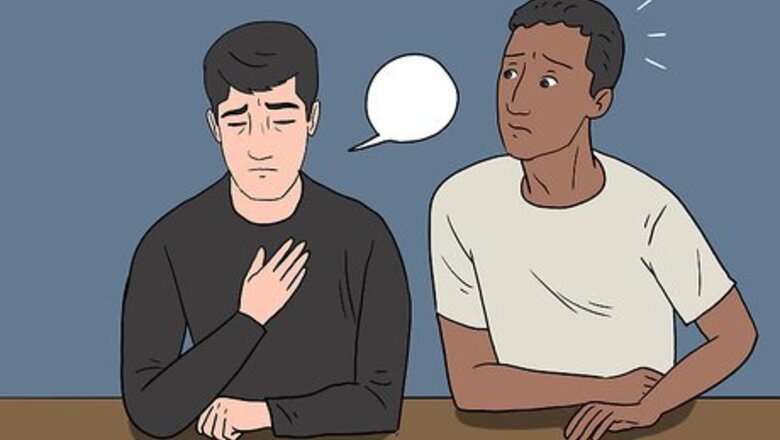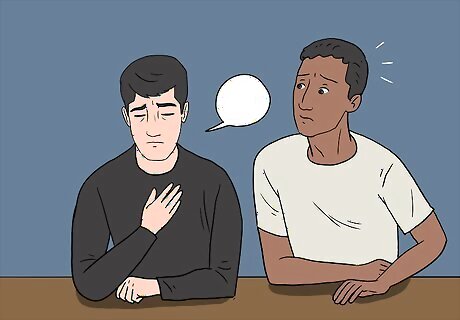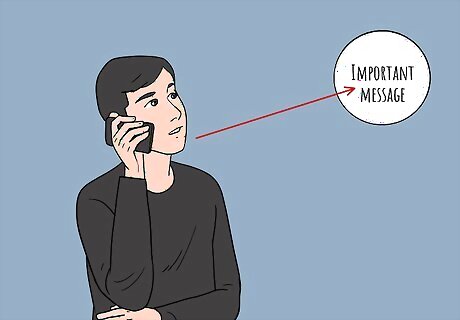
views
Choosing an Approach

Consider grieving with them rather than waiting for acceptance. It's okay to tell your friends and family about your news before you have accepted it yourself. In fact, they can be a great comfort and support during this time. Sharing and talking with those closest to you can help you make sense of what's happening and effectively grieve for what's being lost. Don't hold out for a certain stage in the grieving process. As soon as you feel ready, share with them.

Tell them on your time, but sooner rather than later. You’re under no obligation to tell anyone anything about your impending death, but sharing the information almost always provides more relief and comfort than withholding it. Give yourself some time to process the reality of your situation, but don’t wait for the exact perfect moment to tell your friend—sadly, you may not be around for that perfect moment. You probably don’t want to share this information by text or at the end of a quick phone call, but a relatively quiet moment together may do.

Choose a setting that suits your needs and, if possible, theirs. Put your comfort and needs first, and then factor theirs in. If you prefer a one-on-one conversation, that’s great. If you’d prefer other friends to be there, or even a doctor, nurse, or counselor, that’s perfectly okay as well. It’s not selfish to want to share this information on your own terms. If you can find a way to accommodate them, for instance by going to their house since you know they feel most comfortable there, do so only if it does not negatively impact your comfort level.

Let them know ahead of time that you have something important to discuss. This way, they might not be so completely blindsided when the discussion quickly turns to serious matters. They also may be more mentally and emotionally prepared to listen closely and share deeply. You might call or send a simple message like: “Jody, could you come by around 2 on Wednesday? I have an important matter I need to talk about with you. Thanks.” However, if you know the person tends to worry a great deal and may become anxiety-ridden by the mention of unknown “important news,” you may choose not to reveal this until the actual conversation begins.

Approach your death the way you have lived your life. If you’ve always been a jokester who’s never been serious about anything, there’s no rule that says you have to become all somber about sharing this information. If laughter helps, laugh. If crying helps, cry. If writing down what you want to say and reading it to them works for you, do it. However, even if you’re someone who always likes to speak “off the cuff,” you may want to put a bit of thought into the general tone and parameters of what you want to share.

Write a letter if you simply can’t face having this conversation. A face-to-face conversation is likely to be more cathartic and beneficial for many people. However, some people are simply more comfortable with writing than they are speaking, especially regarding difficult subjects. If this is the case for you, it’s okay to write your friend a letter, or even send an email. When writing, you may want to follow the same general guidelines for having a spoken conversation—asserting the importance of your friendship, clearly explaining the reality of your situation, sharing your emotions, and asking them to share their feelings and remain a part of your life. This isn’t meant to be a “read this after I’m gone” letter, though. Tell them what’s happening to you, and how much they mean to you, while you’re still around. If you're nervous about sharing the letter with them, you can practice delivering the letter online through discussion forums. Many sites related to illness or coping with life's struggles offer this feature. For example, the charity Parkinson's UK has an active forum.

Ask them to keep the information private, if that's a concern for you. It's likely that the people close to you will want to share your news with others. This is a natural reaction on their part. However, you may prefer to tell people yourself. If you don't want them to tell anyone else, let them know this during the conversation. Say, "Please don't tell anyone else what I'm telling you right now. I want the news to come from me." You may also consider telling them who else knows about your condition, as they may want to reach out to other loved ones for comfort.
What to Say

Start by telling them how much they mean to you. No one tires of being told how much someone else cares about them, so reiterating the importance of your friendship can help start this difficult discussion on a more positive note. Say something like “Karen, you’ve been my best friend for many years now, and honestly have become the sister I never had before. You’ve been there when I’ve needed you so many times, and now I need to share something important with you.”

Describe your situation as frankly and honestly as you can. No matter how close of a friend they are, you don’t owe them any details that you don’t wish to share. However, you should be crystal clear that you are dying. This helps overcome people’s tendency to “hear what they want to hear”—for instance, your friend might convince themselves that you only “might be dying.” Try something along the lines of “Karen, my pancreatic cancer has returned, and I’ve consulted with my doctors and decided not to undergo any more treatments. I am going to die, probably within 2 months.”

Ease their discomfort by being yourself. There’s a good chance your friend won’t know how to respond—they may sit there in stunned silence. Assure them that it’s okay for them to be themselves and express their feelings, because that’s what you’re doing too. You might say “I know this is hard for you to hear, and it was hard for me to share, Karen. But I’m still here, and I’m still me, and I want us to be able to talk openly like we always have.

Tell them how you are feeling. Don’t try to shield your emotions in order to spare them from pain. Remember why they are such a good friend in the first place—because you can share with them how you’re feeling. Tell them something like “I’ve accepted that I’m dying, and I’m at peace with that reality—mostly, anyway. Of course I get sad, scared, and angry thinking about it sometimes.”

Ask them to be understanding of your struggles. You shouldn’t feel like you have to apologize for the ways in which your impending death might affect your emotions and actions. That said, making your friend aware of this reality can clarify that you don’t intend to withdraw from them, and in fact really want them to remain by your side. You could say “When I do feel down about the fact that I’m dying, I might want to be alone for a while, and I might not always answer your calls. But please keep calling, because I want and need you to still be part of my life.”
Continuing the Conversation

Accept that they may react in a number of different ways. There’s no way to know how your friend will respond. They might sob, angrily refuse to believe what you’re telling them, or withdraw into a shocked silence. Don’t hold their reaction against them, and don’t feel bad about making them upset. Instead, validate their feelings in the same way that you want them to accept yours. If they’re sobbing, you might say something like “I know this is hard to deal with, but I want us to help each other through it.” Consider also giving them a hug, or crying with them if you feel like it. If they refuse to believe you, try “Believe me, I wish it wasn’t true, but it is. I’m going to die soon, and I want you to be a part of my life to the end.” If they are stunned and need some time to process the news, allow them to have it. Just sit quietly for a few moments, and if necessary ask if they’d like to continue the conversation later.

Encourage them to ask questions and express their feelings. Some people will want to know the specific details of your condition, which may help them to accept the reality of your situation. Others may want to know what it’s like to know that your death is coming, because they’ll naturally start thinking about how they’d handle the situation. Share as much as you’re comfortable giving them. Most people don’t like talking about death, but this may be an instance in which the two of you can more freely discuss the meaning of both life and death.

Offer them specific ways they can help, if they ask. There’s a good chance your friend will want to do something—anything—to help, but they may have no idea what they can do. If they give a general offer to help, don’t be shy about giving them specific ways they can do so. You might say something like one of the following: “Well, it is getting hard for me to get out for groceries. Maybe you could pick up a few things for me a couple times a week.” “I’d really like to organize those family photo albums, and I’d love to have a hand with that.” “All I really need is for you to keep calling and visiting and being my best friend.”

Be clear that you aren’t saying goodbye yet. Sometimes this initial conversation can feel like your last conversation. However, even if your death is likely to occur very soon, don’t worry about making sure the conversation has the gravity of your “last words” with your friend. Instead, focus on your desire to keep your relationship close right up to the end (if that is your wish). Preparing for death does not mean ignoring your life. Focus on making the most of your life and having your friend be a part of it.















Comments
0 comment